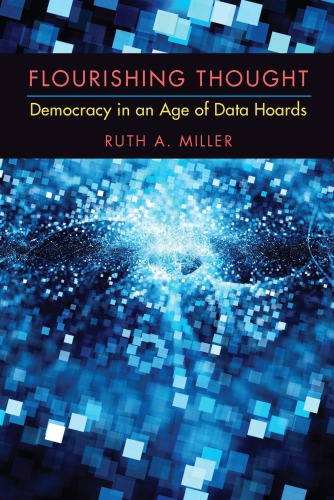Product desciption
Flourishing Thought Democracy In An Age Of Data Hoards Ruth A Miller by Ruth A. Miller 9780472130108, 0472130102 instant download after payment.
Challenging the posthumanist canon that celebrates the preeminence of matter, Ruth Miller, in Flourishing Thought contends that what nonhuman systems contribute to democracy is thought. Drawing on recent feminist theories of nonhuman life and politics, Miller shows that reproduction and flourishing are not antithetical to contemplation and sensitivity. After demonstrating that processes of life and processes of thought are indistinguishable, Miller finds that four menacing accumulations of matter and information—global surveillance, stored embryos, human clones, and reproductive trash—are politically productive rather than threats to democratic politics. As a consequence, she questions the usefulness of individual rights such as privacy and dignity, contests the value of the rational metaphysics underlying human-centered political participation, and reevaluates the gender relations that derive from this type of participation. Ultimately, in place of these human-centered structures, Miller posits a more meditative mode of democratic engagement.
Miller’s argument has shattering implications for the debates over the proper use and disposal of embryonic tissue, alarms about data gathering by the state and corporations, and other major ethical, social, and security issues.
“In this markedly original work, Miller draws insightful lessons from the material, informational and environmental dimensions of life, exploring the productive and thoughtful democratic processes that proliferate when information and systems themselves become political actors and take political center stage.”
—Mary Hawkesworth, Rutgers University
“Miller establishes a clear and convincing framework for taking nonhuman reproduction seriously in relation to democratic political engagement. Flourishing Thought contributes to the developing field of nonhuman thought and politics and focuses specifically on reproductive and data processes in order to demonstrate how politics are reworked when the human subject is no longer the key reference point for conceptualizing or addressing these issues.”
—Jennifer Gabrys, University of London
“In broadest terms, Miller is challenging the contours and assumptions of conventional rights-based, human-oriented democratic political theory, in part by questioning the traditional Western idea of the autonomous, Cartesian, bounded, rational subject in control of HIS thoughts. Miller’s case studies are very clear in revealing the actions of the ‘nonhuman’ in boundless, reproducing things like bacteria, embryos, clones, trash, and data. It is the organizational and decision-making aspects of these things, their memory and sensitivity, that gives them a political aspect.”
—David Caudill, Villanova University
Ruth A. Miller is Professor of History at the University of Massachusetts Boston.


